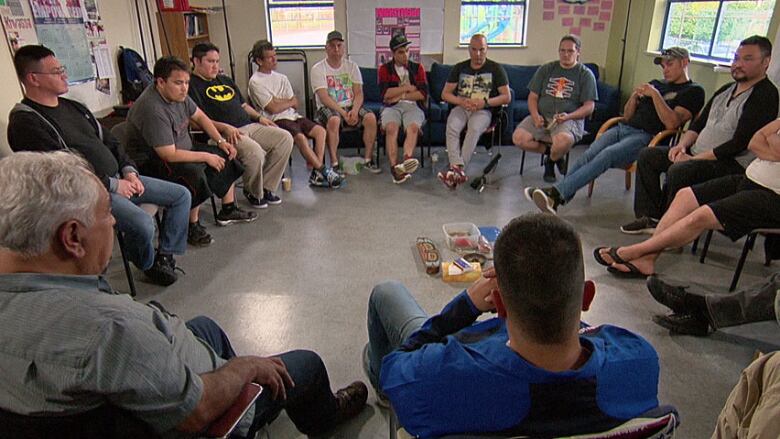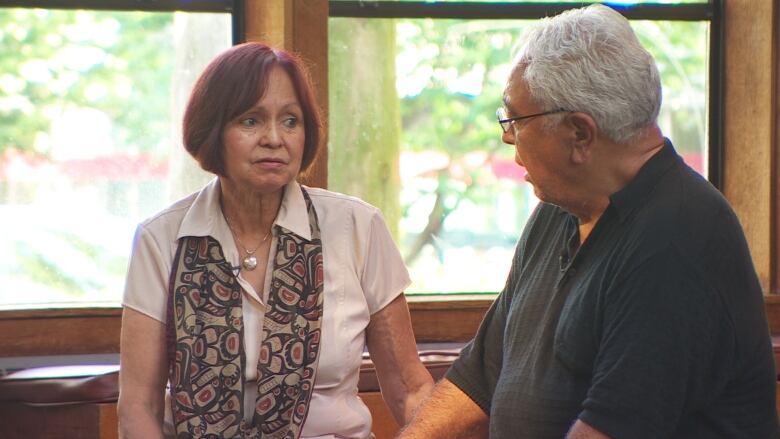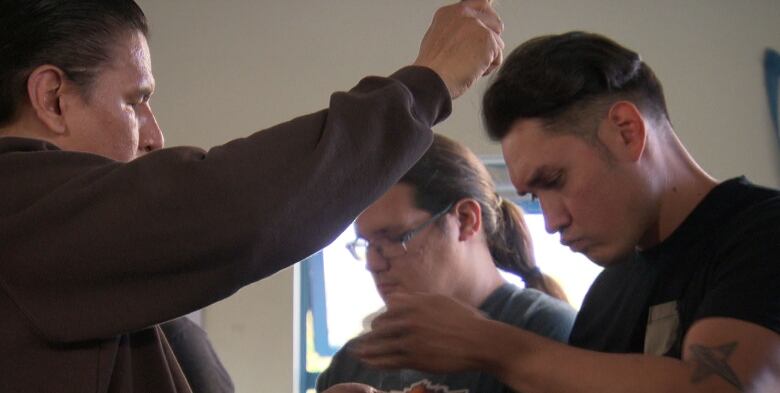'Warriors Against Violence' tries to heal aboriginal men
Vancouver program run on a shoestring by couple with own history of domestic abuse
The handsome, clean-cut man in his early 30s has a faraway look in his eyes as he struggles to recount an evening years ago when he assaulted his girlfriend and landed in prison.
"The worst part is, I don't know exactly what I did. I saw pictures of it when I sobered up the next day. It put a lump in my throat, to think I was capable of doing that."
As he shares his story, 15 men of all different ages surround him, listening intently. Sage and sweetgrass smoke wafts about the all-purpose room in a community centre in Vancouver's Eastside.
This talking circle is the heart of Warriors Against Violence, a prevention program founded on the belief that the best way to end family violence in aboriginal communities is to help men heal.
"We help the men learn how to respect all women," says Joe Fossella, co-founder of the program. "To help them look at themselves about why we are so pissed off at the world and angry.
"Because our main targets are usually our wives or girlfriends or children. That's the sad part of it."
- Full coverage: Truth and Reconciliation Commission report
- Alberta premier calls for inquiry into murdered and missing aboriginal women
For 12 years, Warriors Against Violence has met twice a week, in the evenings, free to anyone.
The men who come here range from teenagers to seniors. Some are ordered by courts to attend; most come voluntarily. In the past year alone, Warriors saw over 400 clients.
"They don't know how to communicate their feelings," says Joyce Fossella, executive director of Warriors. "They feel inadequate. They feel vulnerable. They feel hurt. And the only way they know how to express any of that pain within is to lash out and be angry."
Histories of violence
In this healing circle, some men admit they abuse women, but many also disclose for the first time the trauma they witnessed or suffered as children.
"I grew up almost like every other child on a reserve severe poverty, severe abuse, severe alcoholism. I thought it was a regular way to live," says one man.
"I grew up with violence in my neighbourhood and school, and it's just the way things were growing up on the rez," says another.

Studies suggest that over half of men who abuse women say that a family member has abused them. But in this group, facilitator and residential school survivor Blair Goodwill won't let these men off the hook.
"'Oh, it wasn't my fault.' That's a bunch of bologna," says Goodwill, originally from Saskatchewan. "We cannot blame nobody except ourselves.
"That's why I say I'm still that angry child from residential school, from growing up in an abusive home. Except, I learn to work with it in a better way, to give back to the people."
In addition to guiding the talking circle, the facilitators here teach strategies to deal with stress and anger, such as learning to call for "time-outs" and communications skills. The men also participate in a sweat lodge during the program.
'A very abusive man'
Perhaps the most remarkable thing about this program is the couple who run it. They have been married nearly 50 years, and once had an exceedingly violent relationship of their own.
"He was an angry person, a very angry person behind closed doors," says Joyce Fossella of her husband Joe.
The abuse began three months into their marriage, when Joe gave Joyce a black eye. The physical, emotional and psychological abuse steadily escalated, lasting over 20 years.

"I'd viciously yell and scream at her, and rage and intimidate," says Joe, a former alcoholic. "I was a very abusive man."
It came to an end, when Joyce finally demanded he get help. Joe found a group therapy session for men, where he admitted for the first time that a stranger had sexually abused him as a child, and that his own father beat him and his mother severely.
"When I got that 'aha moment' in my life, when I dumped all my crap, I felt like the weight of the world was lifted off my shoulders," says Joe. "I told Joyce, what did I wait so long for?"
He later helped start Warriors, hoping it would encourage other aboriginal men to deal with the root causes of some of their behaviour.
Mostly volunteers
Warriors Against Violence operates on a shoestring budget of $85,000 per year from Vancouver Coastal Health and the City of Vancouver.
That's not enough to pay a full-time administrator, and the four group facilitators often volunteer their time to ensure the circle runs year-round.
"There are very few services for men," says Joyce Fossella. "It's very difficult getting funds for men's programs."
Last April, the Conservative government responded to calls for an inquiry into missing and murdered Indigenous women with a $200 million action plan spread over five years to prevent family violence in aboriginal communities.
Five million dollars was earmarked to "engage men and boys off and on reserve to prevent violence."
That money headed to Status of Women Canada, where officials say it's been allocated toward "the existing women's program." No new projects are planned, though proposals are welcomed.
Critics say not enough of that "action plan" funding is getting to front-line prevention groups.
"The kinds of priorities we see in this action plan don't resonate with the kind of priorities we hear from indigenous communities," says Niki Ashton, NDP critic for aboriginal affairs. "There's no question programming with men is critical and needs to be supported by the federal government."

Others say provincial funding is also focused too much on crisis response.
"Prevention has not been a priority," says Melanie Mark, a former youth advocate in the office of B.C.'s Representative for Children and Youth and now the provincial NDP candidate for Vancouver-Mount Pleasant.
"We have money for courts. We have money to enforce. We have money to house people in jail. But we don't have funding to keep families together, by empowering and educating them."
Joyce Fossella readily admits Warriors Against Violence doesn't fix every man, but she's seen plenty of success stories.
"I can go to gatherings and see these families that were in Warriors years ago. They've got their children back. They're not going to prison. That's the rewards we receive, when we see people make it."













_(720p).jpg)


 OFFICIAL HD MUSIC VIDEO.jpg)
.jpg)



























































































